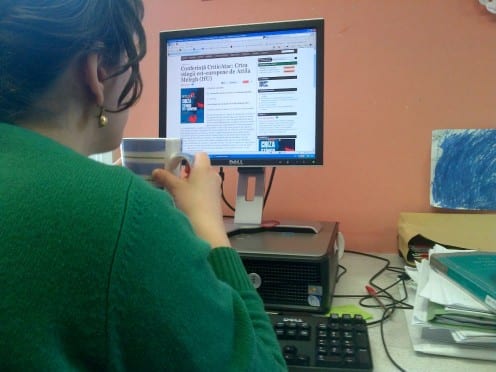Different types of news
By Razvan Nicolescu, on 29 August 2013
There are two local newspapers and a regional one in the Italian town where I am conducting fieldwork. They appear once a week before the weekend and are distributed freely in the main hot spots of the town, like cafés and retail units. The biggest one is published in a few thousand copies, a significant number when one considers the town’s population is almost 20,000. Its editorial line is strongly on the social side, so that more popular themes like politics are not discussed. While the main editorial team is composed by a few men who work pro-bono for the publication, anybody in the local community can contribute as author. The editors encourage this kind of public involvement through a series of initiatives such as local writing contests or symbolic prizes offered to prestigious Italian journalists. Last year around one hundred people from the local community wrote at least one article for the journal, out of which more than a dozen were considered constant contributors.
The impact of this journal on the social life of the town is amazing. Almost every adult who enjoys reading newspapers reads carefully at least the main column on the front page which represents the subject of the week. This could be then debated over a few weeks in different public spaces, in the subsequent numbers of the journal, or in various other local media, such as Facebook. People usually trust the information in the journal much more than the news coming from more distant sources such as national journals or the RAI. It seems to represent a sort of undeniable proof for the different social issues within the local community.
I will not discuss here the intellectual and cultural issues that are at stake with this journal as neither my research is interested in these sorts of disputes. Rather, I am interested in how the local population relates to this particular media and how different this relationship is when the same content is made available on Facebook. There is a whole discussion on the role of social media in the current Italian society, see, for example, the way the political movement MoVimento 5 Stelle (Movement 5 Stars) has constructed much of its political success on the massive popular mobilisation through the internet and social media. However, I will limit this posting to a few considerations on how people in the small town relate to the news on Facebook.
If teenagers and some young people could easily have 800-1,200 Facebook friends, most of the adult population have somewhere between a few tens and 200. The only adults who reach the teenagers’ numbers of online connections are particular public actors such as artists, social activists, entrepreneurs, or people involved in different ways in media. Their Facebook profile is almost the same: they post on different social issues or share joking posts and let their online connections comment or disseminate this information. As these actors recognise that their audience is very eclectic, which also implies they do not necessarily share the same the political or social views, they usually prefer to not moderate these conversations. Their most common explanation is they do not afford to loose connections or their interventions are less important than the initial postings. At the same time, if some people enjoy participating to the online debates, most of the audience does not. They rather prefer to discuss the different issues offline, within the family, or in particular circles of friends. It is here where Facebook seems to act like a newspaper. Like journals wait for clients in an empty caffe, Facebook pages wait for people to access them when they don’t have anything else to do.
However, the type of information individuals gather from the two sources are very different. If in the local newspaper people are interested in the public news, in Facebook users tend to look for the private persons who are interested in news. To wait for public news on Facebook is nonsense. This might be interesting for different activists or entrepreneurs, but most of the people seem to spend huge amounts of time online just trying to find the information that is most private and available in a relatively public environment. The reasons could be pure friendship or curiosity. What is important is that most of the time in the private world of Facebook, news is unimportant if it do not serve to better understand your peers.
 Close
Close







